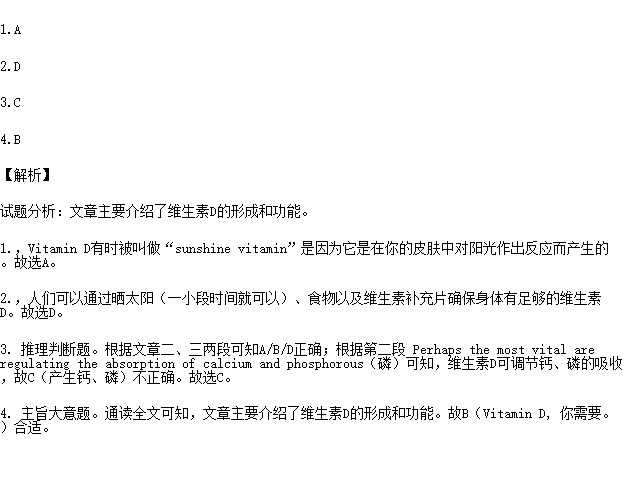题目内容
Think about vitamin D when you’re catching up on summer rays. It’s sometimes called the “sunshine vitamin” because it’s produced in your skin in response to sunlight. Vitamin D is a fat-soluble (脂溶性的) vitamin in a family of compounds that includes vitamins D-1, D-2, and D-3. It can affect as many as 2,000 genes in the body.
Vitamin D has several important functions. Perhaps the most vital are regulating the absorption of calcium and phosphorous(磷), and promoting normal immune system function. Getting enough vitamin D is important for normal growth and development of bones and teeth, as well as improving resistance against certain diseases.
In addition to its primary benefits, research suggests that vitamin D may also play a role in:
reducing your risk of multiple sclerosis(多发性硬化), according to a 2006 study published in the Journal of the American Medical Association
decreasing your chance of developing heart disease, according to 2008 findings published in Circulation
helping to reduce your possibility of developing the flu, according to 2010 research published in the American Journal of Clinical Nutrition
regulating mood and warding off depression
losing weight or preventing heart disease
How do you get it? Your body produces vitamin D naturally when it is directly exposed to sunlight. A little can go a long way. All you need is 10 minutes a day of midday, pre-sunscreen sun exposure,especially if you have fair skin. Besides getting vitamin D through sunlight, you can also get it through certain foods and supplements to ensure adequate levels of the vitamin in your blood.
1.Why is Vitamin D sometimes called “Sunshine Vitamin”?
A. Because it is produced in your skin reacting to sunlight.
B. Because it is named a fat-soluble vitamin.
C. Because it is produced with enough sunshine.
D. Because it is like sunshine in summer.
2.How can a person ensure enough Vitamin D in his/ her body?
A. He/ She could ask doctors for help.
B. He/ She should walk a long way in the sunlight.
C. He/ She should be exposed to sunlight for a long time.
D. He/ She should get it through sunlight, foods and supplements.
3.Which of the following is NOT the function of Vitamin D?
A. Preventing heart disease.
B. Helping the body grow normally.
C. Producing calcium and phosphorous.
D. Decreasing anxiety and nervousness.
4.Which is the best title of the passage?
A. Vitamin D Family
B. Vitamin D, You Need It
C. Ways to get Vitamin D
D. A Good Medicine—Vitamin D
 名校名师培优作业本加核心试卷系列答案
名校名师培优作业本加核心试卷系列答案 全程金卷系列答案
全程金卷系列答案
